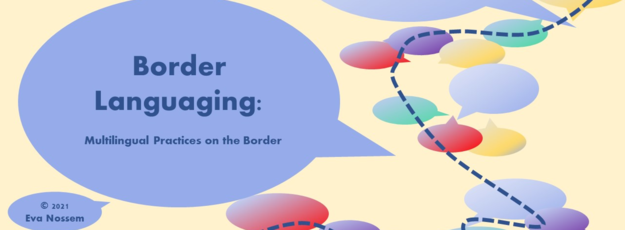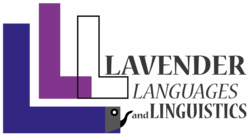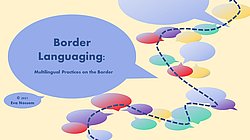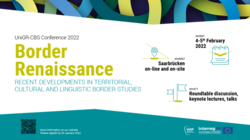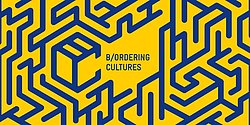Borderlanguaging: Multilingual Practices on the Border
Book Project
Contact: e.nossem at mx.uni-saarland.de
!!! NEWS !!!
We've received a grant for the Open Access publication of the volume! The funding is provided by Saarländische Universitäts- und Landesbibliothek (SULB)
Planned publication: Summer 2025
UNITA Erasmus BIP "Borders," University of Turin
Lecture "Border Languaging: Multilingual Practices on the Border" at the 2023 UNITA Erasmus BIP on "Borders" in Turni (Italy)
by Eva Nossem
here's more info and the program:
Borderlanguaging: Multilingual Practices on the Border
Book Project
Contact: e.nossem at mx.uni-saarland.de
!!! NEWS !!!
The book proposal has been accepted by the series editors and by the publisher! The border languaging volume will appear in the series "Border Studies: Cultures, Spaces, Orders" with Nomos, series editors Prof. Dr. Astrid Fellner, Dr. Christian Wille, Prof. Dr. Konstanze Jungbluth und Prof. Dr. Hannes Krämer
Lavender Languages and Linguistics #28
Keynote Lecture "Queer Border Languaging" at the 2022 LavLang #28 Conference in Catania (Italy)
by Eva Nossem
for the general CfP check out the conference website: http://www.lavlang28.unict.it/
Here's my abstract:
The processual shift, away from thinking language as a fact towards an understanding of “speech and writing [as] strategies for orienting and manipulating social domains of interaction” (Mignolo 2000: 226) finds its expression in the move from ‘language’ to ‘languaging.’ Such “thinking and writing between languages” (Mignolo 2000: 226) is thus understood as a social meaning making process in constant (re-)construction in relation to its context of use, or “in sensitivity to environmental factors,” as Canagarajah puts it (2007: 94), or, as Garcia and Wei affirm, “The term languaging is needed to refer to the simultaneous process of continuous becoming of ourselves and of our language practices, as we interact and make meaning in the world.” (Garcia & Wei 2014: 8).
In a similar vein as “treat[ing] language as dynamic and emergent rather than as a reified code” (Baynham & Lee 2020: 15), a shift has also occurred from a static understanding of the border to dynamic processes and complex interwoven practices (Wille, Fellner, and Nossem: forthcoming). Since the beginning of Border Studies, we have observed a continuously shifting take on the nature, creation, and work of borders: From a separating line of division to a connecting suture, from a rigid separator to a mobile and flexible ordering principle, from a static and factual object to a performed action, a practice becoming operative in continuous repetition – the border has proven itself as fluid as its understanding. Recent approaches have focused on the connecting – though nevertheless often violent – qualities of borders, and placed emphasis on border regions as places of encounter, as contact zones (Pratt 1991), as borderlands (Anzaldúa 1987), as (hybrid) spaces/places of in-between as well as and-both.
In my talk, I endeavor to carve out the creative and critical potential of language in use in the field of tension where ‘queer’ meets ‘the border,’ that is in the intersection between queer studies and linguistic border studies. The focus on language practices (on the border) as signaled by the term ‘(border) languaging’ emphasizes the agency of the language user in meaning making processes (cf. Garcia & Wei 2014: 9), thus particularly inviting us to attend to queer voices speaking from the border. Beyond questions of identity construction in language, the spatiality of language, the mobility of linguistic/semiotic resources and their users etc., I will focus on the potential for alternative forms of producing or unfolding knowledge, and with it an amplification of means to grasp this specific queer border knowledge in language. I would like to subsume such linguistic practices ‘from below’ under the roof of queer border languaging to focus on the disruptive yet productive force of queer linguistic practices at, on, across, and through the border.
Seminar "Code-Switching, Translanguaging, Border Languaging: Conceptualizing Multilingual Practices"
Seminar "Code-Switching, Translanguaging, Border Languaging: Conceptualizing Multilingual Practices"
instructor: Eva Nossem
Course description
Multilingualism is the norm, not the exception. People draw on a vast array of linguistic resources as they engage in heterogeneous linguistic practices.
Multilingualism […] should not be seen as a collection of ‘Languages’ that a speaker controls, but rather as a complex of specific semiotic resources, some of which belong to a conventionally defined ‘language,’ while others belong to another ‘language.’ The resources are concrete accents, language varieties, registers, genres, modalities […] (Blommaert 2010: 102)
This seminar offers an introduction to the many facets and conceptualizations of multilingual practices. We will provide an introduction to some fundamental issues in multilingualism research and give an overview of much-discussed key concepts such as multilingualism, plurilingualism, code-switching, translanguaging, metrolingualism, border languaging and many more.
This seminar will introduce some key theoretical and methodological approaches to multilingualism and outline the struggles in defining ‘language’ and ‘multilingualism’ (and plurilingualism, and plurimultilingualism for that matter). Focusing on standard languages, global languages, as well as pidgins and creoles helps questioning the boundaries of ‘languages.’ We will also address issues of language policy and language ideologies when tackling the interplay of individual and societal multilingualism.
Selected Readings:
- Blommaert, Jan, and Ben Rampton. 2016: ”Language and Superdiversity.” MMG Working Paper 12-09. www.mmg.mpg.de/workingpapers.
- Coulmas, Florian. 2018: An Introduction to Multilingualism: Language in a Changing World. Oxford: Oxford UP.
- Creese, Angela, and Adrian Blackledge (eds). 2018. The Routledge Handbook of Language and Superdiversity. London: Routledge.
- Garcia, Ofelia, and Li Wei. 2014: Translanguaging: Language, Bilingualism and Education. New York: Palgrave Macmillan.
- Gramling, David. 2016: The Invention of Monolingualism. New York and London: Bloomsbury.
- Horner, Kristine, and Jean-Jacques Weber. 2018: Introducing Multilingualism. A Social Approach. 2nd ed. London: Routledge.
- Nossem, Eva. 2022: Borderlanguaging: Multilingual Practices on the Border. Baden-Baden: Nomos.
- Pennycook, Alastair, and Emi Otsuji. 2015: Metrolingualism: Language in the City. New York: Routledge.
Border Renaissance 2022 Conference of the UniGR-Center for Border Studies
Panel "Border Languaging"
chaired by Eva Nossem
In this twofold panel on border languaging we’d like to introduce the contested spatiality of the border to our analysis of multilingual language practices. We aim at focusing on a (critical) analysis of creative (cf. Wei 2011) linguistic practices evolving at, on, and around the border. Of particular interest are linguistic politics and practices as well as discourses to counteract and subvert (re-)nascent borders and borderings.
The work of the border as a productive site of encounter and of the formation of identities and otherness becomes visible through related language use and linguistic performances. In developing a focus on border languaging, we aim to carve out new understandings of (the use of) communicative resources in relation to the border. Such a situated approach to (multi- /pluri-) linguistic performances helps us move beyond naturalized categories of and in language. In examining the interplay of practices of language and borders, contributions from the field of linguistic Border Studies may prove fruitful on different scales, whether e.g. addressing top-down questions of language policy or bottom-up linguistic practices (from below) of everyday interaction, the construction of language borders/boundaries, linguistic dynamics of demarcation, criticism of nativeness, the discursive (re)production and (de)construction of borders, sociolinguistic (cross-)border analyses, or many other takes on every-day, political, and aesthetic linguistic/semiotic practices.
Panel 2-D: Border Languaging I: Linguistic & Discursive Dynamics of Demarcation
- Giulia Pelillo-Hestermeyer (Heidelberg University):
Re-Placing Race: Black Lives Matter and Transculturalization - Marie Veniard (Université de Paris, EDA):
‘Don’t speak on behalf of those concerned’: Study of a Language Ethics Policy adopted by Political Activists campaigning for Foreign Nationals’ Rights in France - Naomi Truan (Leipzig University):
Navigating the German School System when being perceived as a Student ‘with Migration Background’: Ethnicity and ‘Accent’
Panel 3-D: Border Languaging II: Multilingual Everyday Realities
- Philipp Krämer (FU Berlin):
Language Making in and around French: Fixed or Fading Borders and Boundaries in Belgium and the Saar-Lor-Lux Region - Itxaso Etxebarria Lekanda / Karin van der Worp (Euskampus Fundazioa / University of the Basque Country):
Border Languaging between Aquitaine and the Basque Autonomous Community: Multilingual Practices in a University Cross Border Project - Stefan Diemer / Marie-Louise Brunner (Trier University of Applied Sciences):
Effective Digital Language Management: Multilingual Practices on Social Media
KWG conference 2020 "Bordering Cultures: Everyday Life, Politics, Aesthetics"
Panel "Border Languaging: Everyday (Pluri-) Linguistic Practices at the Border"
chaired by Eva Nossem
In our panel we strive to add a linguistic perspective to the conference by focusing on the interplay of borders and orders in conjunction with cultural studies. Seeing languages and borders as both ordering principles and socio-cultural practices, our panel aims to carve out the interwoven functioning mechanisms between languaging and b/orders. In examining the interplay of practices of language and b/orders, contributions from the field of linguistic Border Studies may prove fruitful on different scales, whether e.g. addressing questions of language policy and the construction of language borders/boundaries, linguistic dynamics of demarcation, criticism of nativeness, the discursive (re)production and (de)construction of borders, sociolinguistic (cross-)border analyses, or many other takes on every-day, political, and aesthetic linguistic practices.
This panel puts a special emphasis on practices involving plurilingual repertoires which challenge the (Western) ideologies of monolingualism and separate plurilingualism (cf. García & Wei 2014) and related linguistic-semiotic ordering mechanisms. We present submissions focusing on societal multilingualism and/or individual plurilingualism in relation to borders, as on
• Interlingual, intralingual, intersemiotic, interdiscursive, and embodied translanguaging (Baynham & Lee 2019) at the border,
• Language ideology and dynamics of exclusion,
• Performance of plurilingual repertoires at the border,
• Language policy and power relations,
• Translingualism, translingual activism (Cronin 2003), and translingual practice (Canagarajah 2013, 2014),
• Multilingualism from below (Pennycook & Otsuji 2015, cf. Cuvelier et al. 2010),
• Translating the border.
The panel language is English.
- Mike Baynham (University of Leeds):
Transborder Literacies in an Embordered World - Sewoenam Chachu, Nana Aba Appiah Amfo (University of Ghana, Legon):
Accessing Healthcare across Borders: Linguistic Strategies Employed in Multilingual Cross-Border Healthcare Interactions in West Africa - Olga Dorokhina (Caucasus International University):
Language as a Practice of (Re)production and (De)construction of Borders in Poly-Cultural Divided Societies (on the Example of Georgia - Marie-Louise Brunner, Stefan Diemer (Trier University of Applied Sciences):
Virtual Border Crossing and Plurilingual Practices on Social Media
